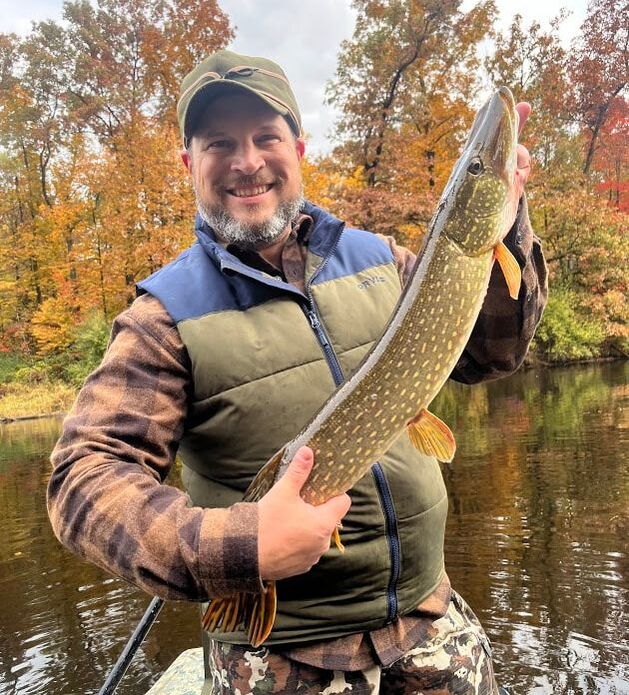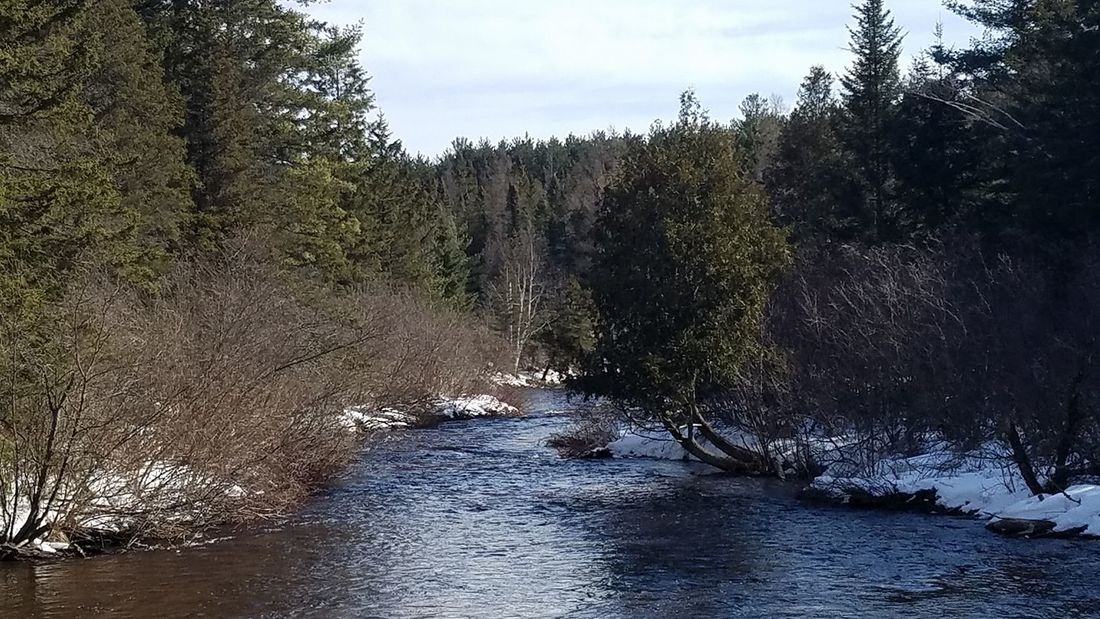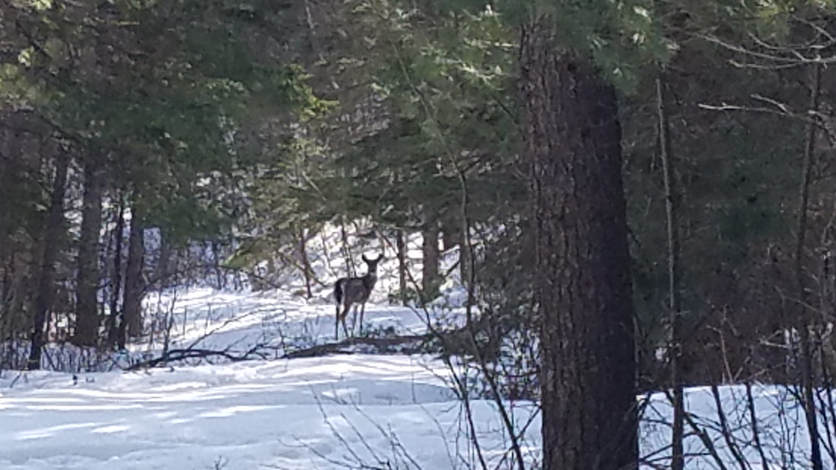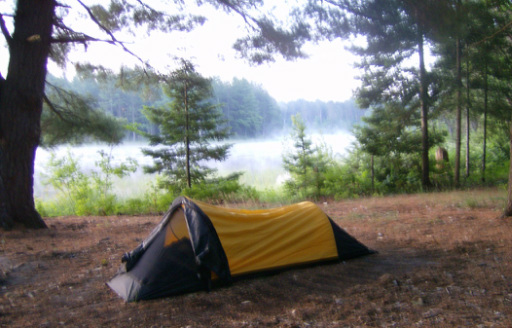|
I had big plans for Earth Day weekend in April. Epic plans, like fastpacking the entire 80-mile High Country Pathway through and around the Pigeon River Country north of Gaylord. Fastpacking combines ultralight backpacking with trail-running. I even had plans of setting the fastest known time (FKT) for the trail. Those plans didn’t include, though, the more than two feet of snow that dumped on the forest just a week earlier. The snow did not abort my plans, though: it amended them. With temperatures expected into the high fifties – and sunny – during the four days I allotted myself, I thought that the snow would melt enough to run the trail after a day or two of snowshoeing, and I could still finish that trail in four days that most people take a week to complete in good weather. As an experienced outdoorsman, though, I should have known that you can’t force your plans on nature. There are days in the fall when I want nothing more than to still-hunt deer all day, moving silently from tree to tree against the wind, crawling through tall grass, and seeing a deer at full draw before it sees me. Sometimes that’s exactly what I do, but sometimes the leaves are too dry, and the wind is too still, and so I adapt. I sit still. A few years ago changing my plans to nature’s conditions yielded a nice 3 ½ -year-old 8-point buck on the firearm opener in this same forest, which provided a year of venison lunches. I set out from the forest headquarters, seeing a white-tailed deer where the trail crossed through the Pigeon River campground. The river sparkled in the sun. After pushing my pace for five miles, snowshoes breaking through an ice-crusted top layer of snow and post-holing every third or fourth step, I sat down on a stump near where the High Country Pathway splits off from the shorter Shingle Mill Pathway loop. I ate a few protein bars for lunch and calculated that if I kept up my pace and pushed it until dark, I could stay on pace to finish the loop in four days, the weekend plus two vacation days. When I planned this trip nine months ago, though, this was not what I wanted. I wanted to run the trail now covered with snow beneath me. I wanted to dodge roots and leap logs fallen across the trail, sleeping under the stars without a fire and setting the fastest known time. That’s what I had taken those two vacation days for, not this. And I realized quickly that this snow wasn’t melting anytime soon – certainly not within the time I had. Then I thought about that hunt a few years ago, about how I sat down against a tree on a ridge instead of still-hunting, and was rewarded with venison and a better outdoor experience than if I had continued forcing my plans on nature. So how could I adapt this trip? The answer was on my feet. Instead of being frustrated that I couldn’t run the trails I wanted to run, I could appreciate that I was snowshoeing in my favorite forest on a sunny day in April! How often do I get to do that? So I decided to turn this epic four-day fastpack that wasn’t into an overnight snowshoe backpacking trip, and save those two days off for another attempt at setting the fastest known time for the High Country Pathway when I could run it how I wanted. I sat up from the stump, strapped on my pack and stepped back on the trail. I no longer resented the snow; I appreciated it. Ahead on the trail, I saw a movement and the light tan rump of an elk drinking from the headwaters of a small stream where it crossed the trail before flowing down into the Pigeon River. It was either a cow or a young bull that had shed its antlers, but it looked “bullish” to me. So I stood still and watched it until it moved uphill and off the trail. While I was waiting, a raccoon sauntered from tree to tree below me, which I appreciated since “Ranger Rick” is the mascot of my employer, the National Wildlife Federation. Further down the trail, I heard the “woosh” of wings and looked up to see a bald eagle flying overhead. I backtracked the trail to the Cornwall Flats – an old logging site – and slung my hammock and tarp between two trees, flushing a woodcock along the way. The flats are a wetland complex cut by a meandering stream, surrounded by hills. A pair of ducks flew from the wetland. A pair of geese honked before flying overhead. I watched a Cooper’s hawk land on a snag and survey the flats before alighting to hunt whatever it was it saw from its perch. A northern flicker flew over my hammock. A bluejay landed on a branch. A squirrel scrounged for food on a sunny patch of bare ground on the hillside. Though I didn’t complete what I had planned to do that weekend; I did something better because I listened to nature instead of my own ego. I saw an amazing diversity of the forest’s wildlife and thoroughly enjoyed our public lands for a weekend. Just like that hunt a few years ago, my change of plans paid off. The snow is melting, the sun is shining, and birds are chirping. With Spring seemingly around the corner (though in Michigan we could still get arctic weather any day until June), I'm getting psyched for some Springtime backpacking / fly-fishing trips. With that in mind, here's a revised backpacking essay I wrote in 2007 for Woods'n'Water News. |
AUTHOR
Drew YoungeDyke is an award-winning freelance outdoor writer and a Director of Conservation Partnerships for the National Wildlife Federation, a board member of the Outdoor Writers Association of America, and a member of the Association of Great Lakes Outdoor Writers and the Michigan Outdoor Writers Association.
All posts at Michigan Outside are independent and do not necessarily reflect the views of NWF, Surfrider, OWAA, AGLOW, MOWA, the or any other entity. ARCHIVES
June 2022
SUBJECTS
All
|





 RSS Feed
RSS Feed